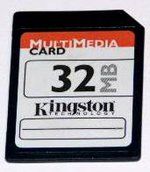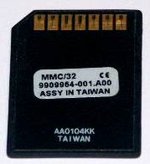Multi Media Card
|
|

Rs-mmc_back.jpg
RS_MMC_32MB.jpg
The Multi Media Card (MMC) is a flash memory memory card standard. Unveiled in 1997 by Siemens and SanDisk, it is based on Toshiba's NAND-based flash memory, and is therefore much smaller than earlier systems based on Intel NOR-based memory such as Compact Flash. MMC is about the size of a postage stamp: 24mm x 32mm x 1.5mm. MMC originally used a 1-bit serial interface, but newer versions of the specification allow transfers of 4 or sometimes even 8 bits at a time. They have been more or less superseded by Secure Digital cards, but still see significant use because MMC cards can be used in any device which supports SD cards.
Typically, an MMC card is used as storage media for a portable device, in a form that can easily be removed for access by a PC. For example, a digital camera would use an MMC card for storing image files. With an MMC reader (typically a small box that connects via USB or some other serial connection), a user could copy the pictures taken with the digital camera off to his or her computer. Modern computers, both laptops and desktops, often have SD slots, which can read MMC cards.
MMC cards are currently available in sizes up to and including 2 GB, and are used in almost every context in which memory cards are used, like cell phones, mp3 players, digital cameras, and PDAs. Since the introduction of Secure Digital few companies build MMC slots into their devices, but the slightly-thinner, pin-compatible MMC cards can be used in any device that supports SD cards. A handful of companies, most notably Nokia, still support MMC exclusively, however.
| Contents |
Reduced-Size Multi-Media Card (RS-MMC)
MMC cards also come in a smaller form factor, of about half the size: 24mm x 16mm x 1.5mm. This alternate form factor is known as Reduced-Size Multi-Media Card, or RS-MMC, and was introduced in 2004. RS-MMC cards are simply smaller MMC cards; by using a simple mechanical adapter to elongate the card, an RS-MMC card can be used in any MMC (or SD) slot.
The only significant hardware licensor of RS-MMC cards is Nokia, who often uses RS-MMC in their Series 60 Symbian smartphones. Newer RS-MMC cards, used in Nokia's newer phones (like the Nokia 6630 and Nokia 6680), support a lower voltage (1.8 V instead of 3 V) mode to reduce battery demand, and these lower-voltage RS-MMC cards, known as Dual Voltage Reduced Size MMC, and can be marketed as MMCmobile when they meet the MMCmobile card standards. These low-voltage cards are backwards compatible with older RS-MMC devices. The dual voltage cards, and the MMCmobile are part of the MMC 4.x standards.
MMC 4.x and secureMMC
Standard 4.x (4.0, 4.1, etc) was released in 2005 (MMCA System Specification 4.1). This new standard involves the higher performace MMC4 (with the same basic MMC form factor but more pins) and called MMCplus and RSS-MC4, marketed as MMCmobile. MMCmobile mirrors the old RSS-MC in that it has the same connections and connection standard, but is about half the size as regular MMC cards. Also in the works is secureMMC, which will feature encryption features similar to Secure Digital or MagicGate Memory Sticks.
See also
External links
- Multi Media Card Association (http://www.mmca.org)de:Multimedia Card

